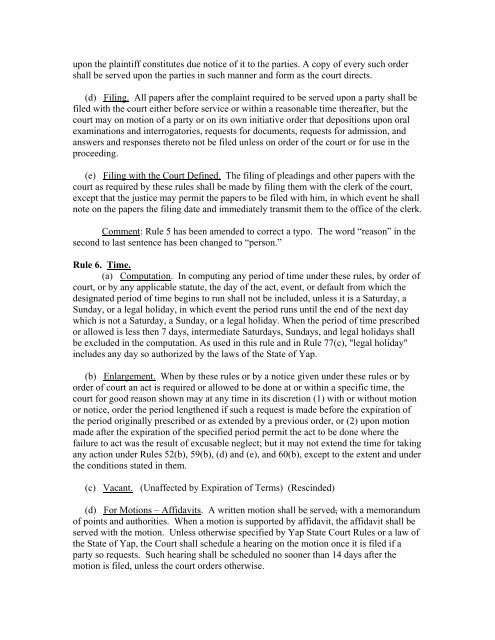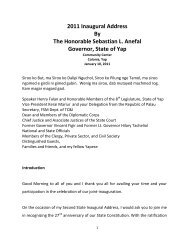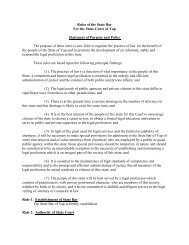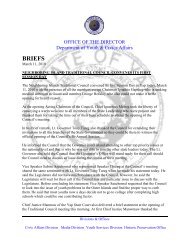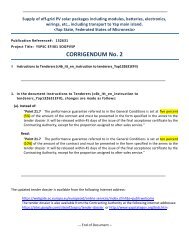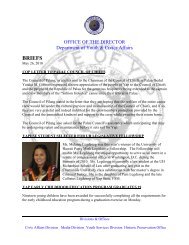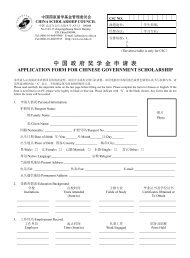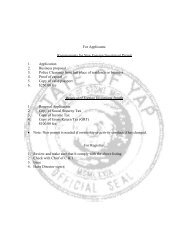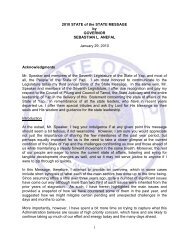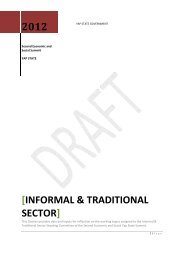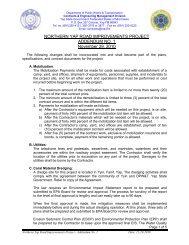RULES OF CIVIL PROCEDURE For the Trial Division of the Yap ...
RULES OF CIVIL PROCEDURE For the Trial Division of the Yap ...
RULES OF CIVIL PROCEDURE For the Trial Division of the Yap ...
Create successful ePaper yourself
Turn your PDF publications into a flip-book with our unique Google optimized e-Paper software.
upon <strong>the</strong> plaintiff constitutes due notice <strong>of</strong> it to <strong>the</strong> parties. A copy <strong>of</strong> every such order<br />
shall be served upon <strong>the</strong> parties in such manner and form as <strong>the</strong> court directs.<br />
(d) Filing. All papers after <strong>the</strong> complaint required to be served upon a party shall be<br />
filed with <strong>the</strong> court ei<strong>the</strong>r before service or within a reasonable time <strong>the</strong>reafter, but <strong>the</strong><br />
court may on motion <strong>of</strong> a party or on its own initiative order that depositions upon oral<br />
examinations and interrogatories, requests for documents, requests for admission, and<br />
answers and responses <strong>the</strong>reto not be filed unless on order <strong>of</strong> <strong>the</strong> court or for use in <strong>the</strong><br />
proceeding.<br />
(e) Filing with <strong>the</strong> Court Defined. The filing <strong>of</strong> pleadings and o<strong>the</strong>r papers with <strong>the</strong><br />
court as required by <strong>the</strong>se rules shall be made by filing <strong>the</strong>m with <strong>the</strong> clerk <strong>of</strong> <strong>the</strong> court,<br />
except that <strong>the</strong> justice may permit <strong>the</strong> papers to be filed with him, in which event he shall<br />
note on <strong>the</strong> papers <strong>the</strong> filing date and immediately transmit <strong>the</strong>m to <strong>the</strong> <strong>of</strong>fice <strong>of</strong> <strong>the</strong> clerk.<br />
Comment: Rule 5 has been amended to correct a typo. The word “reason” in <strong>the</strong><br />
second to last sentence has been changed to “person.”<br />
Rule 6. Time.<br />
(a) Computation. In computing any period <strong>of</strong> time under <strong>the</strong>se rules, by order <strong>of</strong><br />
court, or by any applicable statute, <strong>the</strong> day <strong>of</strong> <strong>the</strong> act, event, or default from which <strong>the</strong><br />
designated period <strong>of</strong> time begins to run shall not be included, unless it is a Saturday, a<br />
Sunday, or a legal holiday, in which event <strong>the</strong> period runs until <strong>the</strong> end <strong>of</strong> <strong>the</strong> next day<br />
which is not a Saturday, a Sunday, or a legal holiday. When <strong>the</strong> period <strong>of</strong> time prescribed<br />
or allowed is less <strong>the</strong>n 7 days, intermediate Saturdays, Sundays, and legal holidays shall<br />
be excluded in <strong>the</strong> computation. As used in this rule and in Rule 77(c), "legal holiday"<br />
includes any day so authorized by <strong>the</strong> laws <strong>of</strong> <strong>the</strong> State <strong>of</strong> <strong>Yap</strong>.<br />
(b) Enlargement. When by <strong>the</strong>se rules or by a notice given under <strong>the</strong>se rules or by<br />
order <strong>of</strong> court an act is required or allowed to be done at or within a specific time, <strong>the</strong><br />
court for good reason shown may at any time in its discretion (1) with or without motion<br />
or notice, order <strong>the</strong> period leng<strong>the</strong>ned if such a request is made before <strong>the</strong> expiration <strong>of</strong><br />
<strong>the</strong> period originally prescribed or as extended by a previous order, or (2) upon motion<br />
made after <strong>the</strong> expiration <strong>of</strong> <strong>the</strong> specified period permit <strong>the</strong> act to be done where <strong>the</strong><br />
failure to act was <strong>the</strong> result <strong>of</strong> excusable neglect; but it may not extend <strong>the</strong> time for taking<br />
any action under Rules 52(b), 59(b), (d) and (e), and 60(b), except to <strong>the</strong> extent and under<br />
<strong>the</strong> conditions stated in <strong>the</strong>m.<br />
(c) Vacant. (Unaffected by Expiration <strong>of</strong> Terms) (Rescinded)<br />
(d) <strong>For</strong> Motions – Affidavits. A written motion shall be served, with a memorandum<br />
<strong>of</strong> points and authorities. When a motion is supported by affidavit, <strong>the</strong> affidavit shall be<br />
served with <strong>the</strong> motion. Unless o<strong>the</strong>rwise specified by <strong>Yap</strong> State Court Rules or a law <strong>of</strong><br />
<strong>the</strong> State <strong>of</strong> <strong>Yap</strong>, <strong>the</strong> Court shall schedule a hearing on <strong>the</strong> motion once it is filed if a<br />
party so requests. Such hearing shall be scheduled no sooner than 14 days after <strong>the</strong><br />
motion is filed, unless <strong>the</strong> court orders o<strong>the</strong>rwise.


